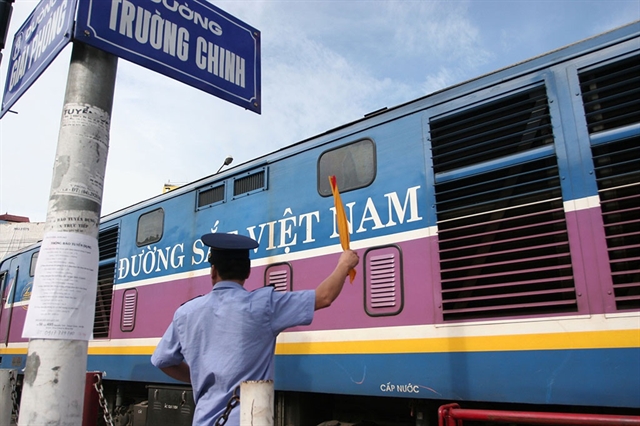HÀ NỘI — The Committee for Management of State Capital at Enterprises (CMSC) has proposed merging two member companies of the Việt Nam Railways Corporation (VNR) in an effort to slash costs and improve efficiency as the industry struggles with the impacts of COVID-19.
According to the proposal which was recently sent to the Prime Minister, CMSC said the two companies should become one.
These two companies had established their own networks of personnel, working offices and warehouses which largely pushed up costs and undermined their business efficiency, CMSC said.
In addition, having two separate railway companies also resulted in the fragmentation of resources in terms of coaches, warehouses, loading and unloading vehicles as well as investment capital, CMSC pointed out, adding that they did not share the available resources which further reduced efficiency.
These existing problems were destroying the strength and resources of both companies and VNR itself. “The merger of the two member companies is urgent to improve the business efficiency of VNR,” CMSC said.
CMSC also urged the restructuring of VNR to be sped up, in accordance with the plan approved by the Prime Minister.
CMSC also pointed other problems in the organisation of VNR, which caused an increase in management costs and failure in using available resources.
VNR currently has five small scale locomotive factories across the country, in Yên Viên, Hà Nội, Vinh, Đà Nẵng and HCM City, which failed to manage and operate locomotive effectively.
CMSC proposed to reduce the number of factories from five to three, which would help reduce costs by around VNĐ63 billion per year.
CMSC also proposed merging three railway management boards into one which would help save VNĐ5.6 billion.
VNR earned a total revenue of more than VNĐ2 trillion in 2016-19 period, averaging VNĐ7.2 trillion per year, with an average annual after-tax profit of VNĐ114 billion and a contribution of VNĐ3.6 trillion to the State budget. The average income per worker was VNĐ8.2 million per month.
But it was hit hard COVID-19 in 2020, seeing a drop of more than 50 per cent in the number of passengers against 2019 and incurring a loss of VNĐ1.3 trillion.
The railway was losing competitiveness against road and air transport due to stagnation in renovation.
During the past 17 years, VNR has been restructured five times but is still to find the best way to operate.
The proposal of merging Hà Nội and Sài Gòn railway transport companies was first raised in 2018 but has yet to be finalised. — VNS
Xem thêm: lmth.lasoporp-regrem-seinapmoc-yawliar-nog-ias-ion-ah/3214001/ymonoce/nv.swenmanteiv
